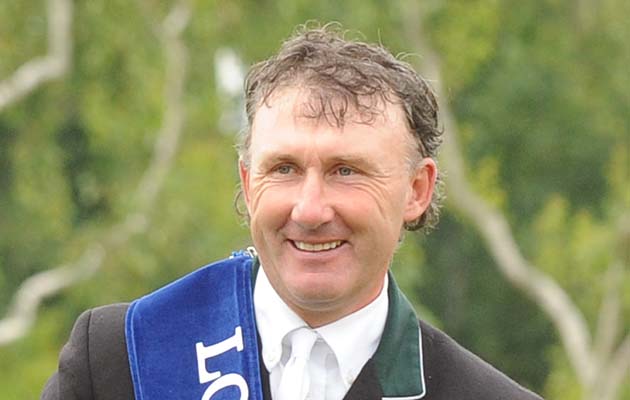Peter Charles on paying vast sums of money to compete, the 2021 opportunities that might exist for some but not for others and pushing young horses too far
Next year, there should be a lot to look forward to, with potentially both a European Championships and an Olympic Games . Not only will it be good for the sport, it will give more riders the opportunity to have something to aim for and work towards.
One of the problems that emerged this season was an inequality in access to the top levels of jumping, with the top 30 in Europe having the ability to compete at a number of five-star shows in St Tropez that were closed to everyone else – unless you were prepared to pay £25,000 to participate. Going into an Olympic year, the FEI needs to ensure that all riders who have qualified for Tokyo have an equal opportunity to compete.
While there won’t be much of a winter circuit in Europe, in the US shows are still going ahead. The downside is that it’s expensive to get there, visas can be a problem and
{"content":"PHA+VGhlcmUgaXMgYWxzbyB0aGUgY2hhbmNlIHRoYXQgQmlkZW4gd2lsbCBpbnRyb2R1Y2UgbG9ja2Rvd25zIHdoZW4gaGUgdGFrZXMgb2ZmaWNlIOKAkyBhbmQgY2FuY2VsbGF0aW9ucyBhcmUgYSBiaWcgcmlzayBpZiB5b3XigJlyZSBwYXlpbmcgb3V0IHRoYXQgbXVjaCBtb25leS4gRm9yIG1hbnkgcmlkZXJzLCB0aGlzIHdpbGwgbm90IGJlIHRoZSB5ZWFyIHRvIGNyb3NzIHRoZSBBdGxhbnRpYy48L3A+CjxwPlRoZXJl4oCZcyBhIE5hdGlvbnMgQ3VwIGluIEZsb3JpZGEgYXQgdGhlIGVuZCBvZiBNYXJjaCwgdGhvdWdoLCBhbmQgaWYgdGhlIENvdmlkIHNpdHVhdGlvbiBlYXNlcyB1cCB3aXRoIHZhY2NpbmUgZGlzdHJpYnV0aW9uLCBpdCB3b3VsZG7igJl0IGJlIHRoZSB3b3JzdCBpZGVhIHRvIHNlbmQgYSB0ZWFtIHRvIGNvbXBldGUuIEFzIGxvbmcgYXMgdGhlIHNwb3J0IGNhbiBnZXQgZ29pbmcgYnkgZWFybHkgc3ByaW5nLCB3ZSBzaG91bGQgc3RpbGwgYmUgb24gdHJhY2s8YnIgLz4KZm9yIFRva3lvLjwvcD4KPHA+PGRpdiBjbGFzcz0iYWQtY29udGFpbmVyIGFkLWNvbnRhaW5lci0tbW9iaWxlIj48ZGl2IGlkPSJwb3N0LWlubGluZS0yIiBjbGFzcz0iaXBjLWFkdmVydCI+PC9kaXY+PC9kaXY+PHNlY3Rpb24gaWQ9ImVtYmVkX2NvZGUtMzEiIGNsYXNzPSJoaWRkZW4tbWQgaGlkZGVuLWxnIHMtY29udGFpbmVyIHN0aWNreS1hbmNob3IgaGlkZS13aWRnZXQtdGl0bGUgd2lkZ2V0X2VtYmVkX2NvZGUgcHJlbWl1bV9pbmxpbmVfMiI+PHNlY3Rpb24gY2xhc3M9InMtY29udGFpbmVyIGxpc3RpbmctLXNpbmdsZSBsaXN0aW5nLS1zaW5nbGUtc2hhcmV0aHJvdWdoIGltYWdlLWFzcGVjdC1sYW5kc2NhcGUgZGVmYXVsdCBzaGFyZXRocm91Z2gtYWQgc2hhcmV0aHJvdWdoLWFkLWhpZGRlbiI+DQogIDxkaXYgY2xhc3M9InMtY29udGFpbmVyX19pbm5lciI+DQogICAgPHVsPg0KICAgICAgPGxpIGlkPSJuYXRpdmUtY29udGVudC1tb2JpbGUiIGNsYXNzPSJsaXN0aW5nLWl0ZW0iPg0KICAgICAgPC9saT4NCiAgICA8L3VsPg0KICA8L2Rpdj4NCjwvc2VjdGlvbj48L3NlY3Rpb24+PC9wPgo8aDM+QSBibGVzc2VkIGxpZmVzdHlsZTwvaDM+CjxwPlRoaXMgaGFzIGJlZW4gYSB5ZWFyIGluIHdoaWNoIHdlIHNob3VsZCBhbGwgZmVlbCBibGVzc2VkIHRvIGJlIGluIHRoZSBob3JzZSBpbmR1c3RyeS4gV2hlbiB3ZeKAmXZlIGhhZCB0byBzcGVuZCB0aW1lIGxvY2tlZCBkb3duIGF0IGhvbWUsIHdlIGNvdWxkbuKAmXQgaGF2ZSBhc2tlZCBmb3IgYSBiZXR0ZXIgbGlmZXN0eWxlIHRvIGhlbHAgdXMgY29wZS48L3A+CjxwPlRoZXJl4oCZcyBiZWVuIGEgbG90IHRvIGxlYXJuIHNwZW5kaW5nIHRpbWUgd2l0aCB0aGUgaG9yc2VzIHdpdGhvdXQgdGhlIHNob3dzIOKAkyBmcm9tIG1vcmUgdGltZSBjb25jZW50cmF0aW5nIG9uIGZsYXR3b3JrIHRvIHVuZGVyc3RhbmRpbmcgdGhlIGhvcnNlcyBhbmQgdGhlaXIgaGFiaXRzLiBXZeKAmXZlIGhhZCA8YSBocmVmPSJodHRwczovL3d3dy5ob3JzZWFuZGhvdW5kLmNvLnVrL3RhZy9hbGljZS1vcHBlbmhlaW1lciIgdGFyZ2V0PSJfYmxhbmsiIHJlbD0ibm9vcGVuZXIgbm9yZWZlcnJlciI+QWxpY2UgT3BwZW5oZWltZXI8L2E+IGNvbWluZyBpbiB3ZWVrbHkgdG8gaGVscCB3aXRoIGRyZXNzYWdlIHRyYWluaW5nLCB3aGVuIHRoZSBydWxlcyBhbGxvdywgd2hpY2ggYWxzbyBoZWxwcyB0byBvcGVuIHVwIHRoZSByaWRlcnPigJkgbWluZHMuPC9wPgo8cD5XZSBjZXJ0YWlubHkgc2hvdWxkbuKAmXQgYmUgY29tcGxhaW5pbmcgYWJvdXQgc2hvd3MgYmVpbmcgY2FuY2VsbGVkIHdoZW4gdGhlcmUgYXJlIHBlb3BsZSB3aG9zZSBlbnRpcmUgbGl2ZXMgaGF2ZSBiZWVuIHdyZWNrZWQgYnkgdGhlIHBhbmRlbWljLiBUaGVyZeKAmXMgbm8gZG91YnQgd2UgYWxsIG5vdyBhcHByZWNpYXRlIHRoZSBsaWZlIHdlIGhhZCBiZWZvcmUsIGFsdGhvdWdoIHBlb3BsZSBoYXZlIGJlZW4gcXVpY2sgdG8gYWRhcHQuPC9wPgo8ZGl2IGNsYXNzPSJhZC1jb250YWluZXIgYWQtY29udGFpbmVyLS1tb2JpbGUiPjxkaXYgaWQ9InBvc3QtaW5saW5lLTMiIGNsYXNzPSJpcGMtYWR2ZXJ0Ij48L2Rpdj48L2Rpdj4KPGgzPuKAnEEgZ3JlYXQgc2hhbWXigJ08L2gzPgo8cD5PbmUgdGhpbmcgdGhhdOKAmXMgYmVlbiBjbGVhciBpcyB0aGUgZ3Jvd2luZyBwb3B1bGFyaXR5IG9mIG9ubGluZSA8YSBocmVmPSJodHRwczovL3d3dy5ob3JzZWFuZGhvdW5kLmNvLnVrL3RhZy9ob3JzZS1zYWxlcy1hdWN0aW9ucyIgdGFyZ2V0PSJfYmxhbmsiIHJlbD0ibm9vcGVuZXIgbm9yZWZlcnJlciI+YXVjdGlvbnM8L2E+LiBBbHRob3VnaCBJIGRvbuKAmXQgYWx3YXlzIG5lZWQgdG8gc2l0IG9uIGEgaG9yc2UsIEkgZG8gbGlrZSB0byBzZWUgdGhlbSBpbiB0aGUgZmxlc2ggdG8gZ2V0IGEgZmVlbCBmb3IgdGhlaXIgY2hhcmFjdGVyLCBhbmQgSSBhbHdheXMgcHJlZmVyIHRvIHNlZSB0aGVtIHdpdGggYSByaWRlciBqdW1waW5nIHRoZW0gdGhhbiBqdW1waW5nIGxvb3NlLjwvcD4KPHA+T25lIG9mIHRoZSBkb3duc2lkZXMgb2YgYXVjdGlvbnMgaGFzIGJlZW4gdGhlIGV4dHJhIHB1c2ggdG8ganVtcCBob3JzZXMgdG9vIHlvdW5nIGFuZCB0b28gb2Z0ZW4uIEl0IHdhcyBhbHNvIGEgZ3JlYXQgc2hhbWUgdG8gc2VlIGZvYWxzIGJlaW5nIGp1bXBlZCBhdCBhIHJlY2VudCBDb250aW5lbnRhbCBzYWxlLCB3aGljaCBqdXN0IGNhbuKAmXQgYmUgcmlnaHQuPC9wPgo8ZGl2IGNsYXNzPSJhZC1jb250YWluZXIgYWQtY29udGFpbmVyLS1tb2JpbGUiPjxkaXYgaWQ9InBvc3QtaW5saW5lLTQiIGNsYXNzPSJpcGMtYWR2ZXJ0Ij48L2Rpdj48L2Rpdj4KPHA+V2hlbiB5b3UgY29tYmluZSB0aGlzIHdpdGggdGhlIHRvbGwgb2YgYWdlIGNsYXNzZXMsIHdoZXJlIHlvdW5nIGhvcnNlcyBhcmUgaGF2aW5nIHRvIHR3aXN0IGFuZCB0dXJuIGFnYWluc3QgdGhlIGNsb2NrLCB5b3UgZmluZCBhIGxvdCBvZiB0aGVtIGFyZSB3b3JuIG91dCBieSB0aGUgYWdlIG9mIHNldmVuLjwvcD4KPHA+U2VlaW5nIG9uIGEgaG9yc2XigJlzIHJlY29yZCB0aGF0IGl0IGhhcyB3b24gYW4gYWdlIGNsYXNzIGlzIHNvbWV0aGluZyB0aGF0IHdvdWxkIG5vdCBpbXByZXNzIG1lIGFzIGEgYnV5ZXIuIElmIGEgaG9yc2UgaXMgd2lubmluZyBhdCB0aGF0IHN0YWdlLCB0aGVuIGl04oCZcyBtaXNzaW5nIG91dCBvbiBhIHByb3BlciBlZHVjYXRpb24sIGFuZCBzcGVlZCBpcyBvdmVydGFraW5nIHRoZSBhcnQgb2YgaG9yc2VtYW5zaGlwLiBJZiBpdCB3aW5zIHRocm91Z2ggc3R5bGUgYW5kIHBlcmZvcm1hbmNlLCB0aG91Z2gsIHRoYXTigJlzIGEgZGlmZmVyZW50IG1hdHRlci48L3A+CjxkaXYgY2xhc3M9ImFkLWNvbnRhaW5lciBhZC1jb250YWluZXItLW1vYmlsZSI+PGRpdiBpZD0icG9zdC1pbmxpbmUtNSIgY2xhc3M9ImlwYy1hZHZlcnQiPjwvZGl2PjwvZGl2Pgo8ZGl2IGNsYXNzPSJpbmplY3Rpb24iPjwvZGl2Pgo8cD5Zb3UgaGVhciBjb21wbGFpbnRzIHRoYXQgaXTigJlzIGhhcmQgdG8gZmluZCBnb29kIGhvcnNlcywgYnV0IHBlb3BsZSBuZWVkIHRvIGxvb2sgYXQgdGhlIGJpZ2dlciBwaWN0dXJlIHdoZW4gdGhleeKAmXJlIHByb2R1Y2luZyB0aGVtIHVsdGltYXRlbHkgdG8gbWFrZSBhIHRvcCBob3JzZS4gQSBkaWZmaWN1bHQgYmFsYW5jZSwgSSBrbm93LCBmb3IgYW55IHJpZGVyIHdoZW4gaXTigJlzIHRoZWlyIGxpdmVsaWhvb2QgYW5kIGV2ZXJ5dGhpbmcgaXMgb3JpZW50ZWQgdG93YXJkcyByZXN1bHRzIGluIG9yZGVyIHRvIHNlbGwgaG9yc2VzLjwvcD4KPHA+PGVtPlJlZjogSG9yc2UgJmFtcDsgSG91bmQ7IDMgRGVjZW1iZXIgMjAyMDwvZW0+PC9wPgo8cD4K"}
You may also be interested in:
H&H’s showjumping columnist reflects on the surge of support to improve the sport in Britain
Credit: www.moisesbasallote.com
Credit: Trevor Meeks
“No scope, no hope” is an oft-used phrase in showjumping circles but, if this amazing photo taken over a practice
Stay in touch with all the news in the run-up to and throughout the major shows and events during 2025 and beyond with a Horse & Hound subscription. Subscribe today for all you need to know ahead of these major events, plus online reports on the action as it happens from our expert team of reporters and in-depth analysis in our special commemorative magazines. Have a subscription already? Set up your unlimited website access now




